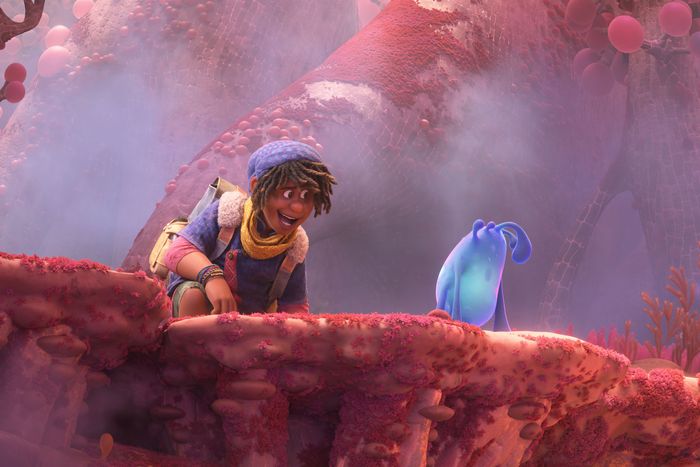
In no sane timeline should members of the moviegoing public feel the need to keep track of executive comings and goings, but the age of conglomerates has made us all into trade journalists. Disney, in particular, has become so massive that it reshapes the entertainment landscape as it lumbers along, its movements signaling possible changes for streaming, for the theatrical fate of animated features, for whether certain franchises are tilting toward TV or film, and for bigger concerns. When the wildly unpopular CEO Bob Chapek was ousted in favor of his returning predecessor, Bob Iger, earlier this week, right-wing outlets tried to frame the surprise as, alternately, a triumph of or a rebuke to corporate wokeness. Who knows where they would have taken things if they’d been aware of Strange World, a new Disney animated movie that was announced, but also seemingly consigned to be quietly dumped, during the Chapek era. It’s a movie that’s all but designed to make conservative commentators lose their minds.
Strange World was directed by Disney veteran Don Hall, of Big Hero 6, written by Raya and the Last Dragon’s Qui Nguyen, and takes place in an isolated community called Avalonia surrounded by impassable mountains. Confusingly, we’re introduced to Avalonia and its horse-and-wagon, Land Without Bread–style struggles via an old-timey newsreel touting the area’s lack of technology, which makes you wonder how the newsreel exists. More than anything, the footage (as well as the Ben Day–dotted spreads that follow) evoke the pulp adventure vibes the movie tries to draw on. Its main character, Searcher (Jake Gyllenhaal), is the son of Jaeger Clade (Dennis Quaid), a swashbuckling adventurer whose only aim in life is to discover a path through the mountains to see what’s on the other side. The two part ways during an expedition when Searcher discovers a plant whose luminous fruit — they’re basically electric Brussels sprouts — are a possible energy source he plans to bring back, while Jaeger wants to keep going. No one’s heard from Jaeger 25 years later, but Searcher has become father to a teenage boy, Ethan (Jaboukie Young-White), and is happily farming the crop he’s dubbed “Pando,” which has powered Avalonia into a city with hovering vehicles, mass transit, and home appliances.
That Strange World’s secondary hero, Ethan, is Black and unmistakably queer (no “exclusively gay moments” here — he does some sweetly awkward flirting with his crush in one of his earlier scenes) is noteworthy. But that development is subordinate to the film’s primary story about how the complete and immediate eradication of fossil fuels is the only way for human life to continue. The Pando crop has started failing because of a mysterious infection that started somewhere deep in the shared roots, and Avalonian president Callisto Mal (Lucy Liu) recruits a reluctant Searcher for an expedition into the earth to find the source of the problem. Searcher’s pilot wife, Meridian (Gabrielle Union), tracks their ship down not long after its departure, revealing that Ethan and the family’s tri-pawed dog, Legend, have stowed away. The group finds its way into a fantastical pink-hued panorama of floating and lumbering monsters, encountering an adorable bloblike ally named Splat (“I want to merchandise this!” yelps one of the crew members upon seeing it), and, naturally, finding Jaeger, still going strong after two and a half decades lost in the wilderness and still more focused on adventuring than on his son.
Strange World is a trippily pretty movie with a series of alien landscapes for its characters to navigate and a big twist that owes less to pulp magazines than to ’60s sci-fi. Its three male characters feel as if they were written to embody baby boomers, Gen X, and Gen Z, which gets tiring almost immediately and continues to grate as they bicker over the course of their journey. So much of Strange World’s audaciousness is front-loaded into its concept, and so little of it comes through in the execution. Its themes linger in the mind longer than any line or emotional beat in part because those elements feel so rote and secondary. Sure, the existence of the movie should be applauded, even or especially because it seems to have terrified its corporate overlords into burying an entry from the animation line, which has traditionally been the spine of the brand. But I’m also tired of measuring social progress by Disney films and applauding the ungainly giant for slowly trudging its way toward the future. If the murine megacorp had any guts, I guess it really would be merchandising Splat all over. But what kind of win would that be?
More Movie Reviews
- The Thriller Drop Is a Perfect Addition to the Bad-First-Date Canon
- The Accountant 2 Can Not Be Taken Seriously
- Another Simple Favor Is So Fun, Until It Gets So Dumb


